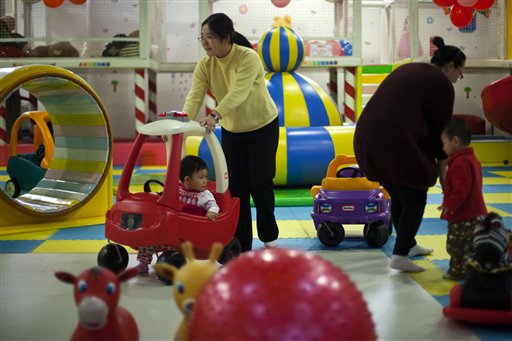
In this Jan. 10, 2013 photo, parents play with their children at a kid’s play area in a shopping mall in Beijing. China will loosen its decades-old one-child policy and abolish a much-criticized labor camp system, its ruling Communist Party said Friday, Nov. 15, 2013. The official Xinhua News Agency said the party announced the changes in a policy document following a key, four-day meeting of party leaders that ended Tuesday in Beijing. AP
BEIJING — China has no intention of abandoning family planning controls soon despite announcing it would ease the one-child policy, a government spokesman said Tuesday, adding that the policy could be loosened further in the future.
Keeping China’s birth rates low remains a long-term priority for the country’s development, National Health and Family Planning Commission Spokesman Mao Qunan told foreign reporters during a briefing in Beijing.
“Family planning work, not just in the past, but even now with the adjustment of the policy, family planning is a national policy for China,” Mao said. “The control of population and keeping a low fertility rate is a long term mission.”
The Communist Party announced last Friday that it would allow couples to have two children if one of the parents is a single child. Previously, both parents had to be an only child to qualify for this exemption. Rural couples also are allowed two children if their first-born child is a girl.
The spokesman said each province will roll out the new exception in its own timeframe depending on its own conditions. Experts estimate around 1 million extra births per year would occur in the first few years, on top of the 16 million babies born annually in China.
The government credits the one-child policy with preventing hundreds of millions of births and helping lift countless families out of poverty by easing the strain on the country’s limited resources.
But the abrupt fall in the birth rate is pushing up average age of the population of 1.3 billion people and demographers foresee a looming crisis because the policy reduced the young labor pool that must support the large baby boom generation as it retires.
Asked if or when China would do away with family planning controls altogether, Mao said the policy would continue to be “adjusted and improved” but “as to when every family might be able to totally return to a natural state, I cannot predict this.”
Mao says he expected the central government to continue to tinker with family planning controls according to population changes and public demands.
RELATED STORIES:
Pregnant ‘Filipina’ trying to skirt China’s one-child rule faces deportation
China think-tank calls for end to one-child policy
Chinese man kills one-child policy officials—media